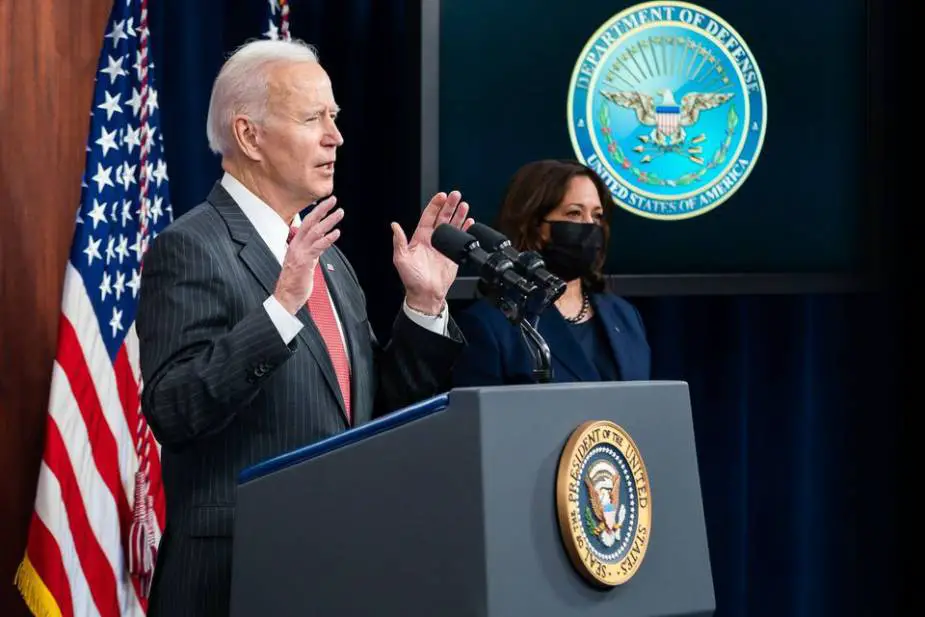Biden administration outlines US FY22 defense budget
The following is from President Joe Biden’s 9 April 2021 correspondence to Congressional Appropriators outlining his Administration’s topline request for fiscal year (FY) 2022 discretionary funding.
Follow Army Recognition on Google News at this link

U.S. President Joe Biden and Vice President Kamala Harris at the U.S. DoD on Feb 10, 2021 (Picture source: U.S. DoD)
“The discretionary request proposes $769 billion in non-defense discretionary funding in FY 2022, a 16 percent increase over the FY 2021 enacted level, and $753 billion for national defense programs, a 1.7 percent increase.”
With specific regard to defense spending, the correspondence notes: the President’s 2022 discretionary request includes $715 billion for the Department of Defense. The discretionary request also discontinues requests for Overseas Contingency Operations as a separate funding category, instead funding direct war costs and enduring operations in the DOD base budget, a significant budgetary reform. It deters China. The discretionary request prioritizes the need to counter the threat from China as the Department’s top challenge. The Department would also seek to deter destabilizing behavior by Russia. Leveraging the Pacific Deterrence Initiative and working together with allies and partners in the Indo-Pacific region and the North Atlantic Treaty Organization, DOD would ensure that the United States builds the concepts, capabilities, and posture necessary to meet these challenges.
Supports Defense Research and Development. DOD plays an important role in Federal research and development that spurs innovation, yields high-value technology, ensures American dominance against near-peer adversaries, and creates good-paying jobs. The discretionary request prioritizes defense research, development, test, and evaluation funding to invest in breakthrough technologies that would drive innovation and underpin the development of next-generation defense capabilities.
Optimizes U.S. Naval Shipbuilding. Maintaining U.S. naval power is critical to reassuring allies and signaling U.S. resolve to potential adversaries. The discretionary request proposes executable and responsible investments in the U.S. Navy fleet. In addition, the discretionary request continues the recapitalization of the Nation’s strategic ballistic missile submarine fleet and invests in remotely operated and autonomous systems and the next-generation attack submarine program.
Modernizes the Nuclear Deterrent. The discretionary request maintains a strong, credible nuclear deterrent for the security of the Nation and U.S. allies. While the Administration is reviewing the U.S. nuclear posture, the discretionary request supports ongoing nuclear modernization programs while ensuring that these efforts are sustainable.
Invests in Long-Range Fire Capabilities. The safety and security of the Nation require a strong, sustainable, and responsive mix of long-range strike capabilities. The discretionary request invests in the development and testing of hypersonic strike capabilities while enhancing existing long-range strike capabilities to bolster deterrence and improve survivability and response timelines.
Ensures Readiness. The discretionary request continues to ensure that U.S. Soldiers, Sailors, Airmen, Marines, and Guardians remain the best trained and equipped force in the world and are always ready to fulfill their obligation to protect the security of the American people.
Promotes Climate Resilience and Energy Efficiencies. It is vital to national security that U.S. military installations, and the mission-critical capabilities these installations support, are resilient to climate-induced extreme weather. The discretionary request supports efforts to plan for and mitigate the impacts of climate change and improve the resilience of DOD facilities and operations. The discretionary request also invests in power and energy research and development in order to improve installation and platform energy performance and optimize military capability.
Counters Emerging Biological Threats. The discretionary request funds programs that support biological threat reduction in cooperation with global partners, emerging infectious disease surveillance, biosafety and biosecurity, and medical countermeasure research and development.
Fulfills America’s Commitment to Military Families. Military families are key to the readiness and well-being of the All-Volunteer Force, and therefore are critical to national security. The discretionary request supports military families by prioritizing programs that directly support military spouses, caregivers, survivors, and dependents.
Divests Legacy Capacity and Force Structure. The discretionary request supports DOD’s plan to divest legacy systems and programs to redirect resources from low- to high-priority programs, platforms, and systems. Some legacy force structure is too costly to maintain and operate and no longer provides the capabilities needed to address national security challenges. The discretionary request enables DOD to reinvest savings associated with divestitures and other efficiencies to higher priority investments.


























